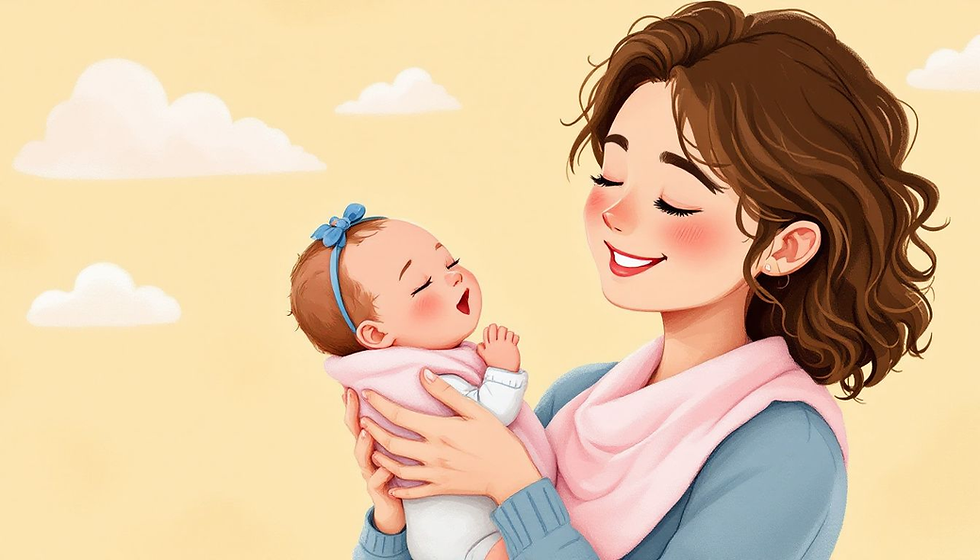When Do You Stop Burping a Baby: Practical Tips for Parents
- The Parent Corner

- Jan 20, 2025
- 7 min read
Updated: Mar 23, 2025
When do you stop burping a baby? Most parents can stop around 4 to 6 months. This period varies and relies on the baby’s growth and signs they can handle gas themselves. In this article, we’ll guide you through the indicators that it’s time to stop burping your baby and what to watch out for.
Key Takeaways
Most babies can stop needing to be burped by 4-6 months, but watching for individual development is key.
Signs that your baby has outgrown the need for burping include contentment and the ability to manage gas naturally.
For babies with reflux, specific strategies like holding them upright after feeding can help prevent spit-up and discomfort.
When to Stop Burping Your Baby

One of the most common questions new parents ask is, “When do I stop burping my baby?” The answer isn’t set in stone because it depends on several factors, including your baby’s physical development and individual needs. Generally, most babies stop needing to be burped by the time they reach 4 to 6 months old.
However, monitoring individual signs of baby is more reliable than relying solely on a child’s age. Many babies show signs that they can relieve their own gas around 3-4 months, such as rolling over or sitting up. These developmental milestones indicate that your baby’s digestive system is maturing and they are becoming more efficient at moving gas on their own.
In the first two to three months, burping is crucial because babies are more likely to swallow air during feedings. If your baby doesn’t burp after a few minutes, it might indicate they don’t need to burp at that moment. However, if persistent issues arise, consulting a health visitor for expert guidance can be very helpful.
Remember, every baby is different. While some might need burping well into their 6th month, others might stop much earlier. Observing your baby’s behavior and development is key to determining the right time to stop burping them.
Signs Your Baby No Longer Needs to Be Burped
As your baby grows, you’ll observe signs indicating they may no longer need to be burped. One clear sign is contentment. If your baby seems happy and comfortable without needing to burp, this is a strong indication that their digestive system is maturing.
Around 3-4 months, many infants start managing gas relief on their own through natural movements like rolling over and wiggling. These physical activities help release trapped air, reducing the need for parental intervention. It’s also essential to consider your baby’s physical development rather than just their age when deciding to stop burping.
Observing these cues helps you know when your baby is ready to move past the burping stage. If your baby stays calm and content after feedings without burping, they are likely capable of handling gas on their own.
Burping Babies with Reflux

For parents of babies with gastroesophageal reflux (GER), the burping routine might look a bit different. Reflux can cause frequent spitting up, crankiness after eating, and even projectile vomiting. These symptoms indicate an immature digestive system that might require more attention.
Managing infant reflux involves keeping the baby upright during feeding and for at least 30 minutes afterward. This position uses gravity to keep the milk down and reduces the likelihood of spit-up. For bottle-fed infants, burp them every 2-3 ounces, and for breastfed babies, burp them when switching breasts.
Gentle back pats work better than strong thumping for burping a baby with reflux. This gentle approach helps release gas without causing discomfort. Holding the baby upright for at least 20 minutes after feeding can further manage reflux symptoms.
Elevating the baby’s head during sleep can help reduce symptoms, but this should be done under pediatric guidance. Developmental milestones like rolling over and sitting up indicate that a baby with reflux can stop being burped.
Nighttime Burping Considerations

Nighttime feedings are challenging, and adding burping can feel overwhelming. Fortunately, parents can usually stop burping a baby at night around two to three months of age. It’s very rare for babies to wake up at night needing to burp.
If your baby is asleep and seems comfortable, it’s generally safe to skip burping. If your baby tends to be gassy, burping them briefly can ensure comfortable sleep. Holding your baby upright for a few minutes after nighttime feedings can help release any trapped air.
Every baby is different. If your baby is content and comfortable without nighttime burping, they’re likely managing their gas well on their own.
Effective Burping Methods

The right burping position method can make the process more effective and comfortable for both you and your baby. Common methods include over the shoulder, in lap, and sitting up. Each has its benefits, and you might find one that works better for your baby.
When burping baby, support the baby’s head and neck, especially for younger infants. This ensures your baby is safe and comfortable during the process. Use firm pats higher on the back to help release trapped air.
Each baby is unique, so try different methods until you find what works best. A burp cloth can help keep things clean and make the process smoother.
How to Burp a Sleeping Baby
Burping a sleeping baby can be tricky, but it’s often necessary to prevent spitting up during sleep. If your baby is gassy, you may need to burp baby immediately after feeding, even if they fall asleep.
To burp a baby that is sleeping, hold them upright and support their head and neck. Gently bounce and rock while rubbing their back to encourage the release of gas. Baby massage can also promote burping and improve overall comfort.
Walking around while holding your baby can calm them and make burping easier. These gentle techniques keep your sleeping baby comfortable and less likely to spit up during rest.
What If My Baby Won't Burp?
Sometimes, despite your best efforts, your baby won’t burp. This can be frustrating, but remember that the frequency of burping needs can vary significantly. Signs that a baby needs to burp include fidgeting, moving their legs to their chest, and making odd facial expressions.
If your baby seems fussy after feeding but won’t burp, try different burping positions or methods like walking around while gently patting their back. Try burping your baby for about five minutes before deciding to stop. If your baby doesn’t burp, they may still burp or spit up later on their own.
Ultimately, patience and persistence are key. Trust your instincts and continue trying different techniques to find what works best for your baby.
Tips for Reducing Air Intake During Feeding
Reducing air intake during feeding minimizes the need for burping and makes feeding sessions more comfortable for your baby. Choosing bottles designed for venting and air control can significantly reduce a baby’s stomach issues. These bottles minimize air intake, leading to a smoother feeding experience.
Adjusting the bottle nipple size can also reduce extra air intake during feeding. Nipple flow and bottle size can influence how much air your baby swallows during bottle feeding. For breastfed babies, a proper latch minimizes air intake and makes feeding more efficient.
Mindfulness of these factors reduces the amount of air your baby swallows, leading to fewer burping sessions and a more content baby.
Additional Techniques for Relieving Gas
Besides burping, several techniques can help relieve gas in babies. Infant massage is a natural way to ease gas discomfort and promote bonding between parent and child. Gently massaging your baby’s tummy while they lie on their back helps move gas through the intestines toward elimination.
Massaging in a clockwise motion is particularly effective for relieving gas. The ‘I love you’ massage technique, where you trace the letters ‘I’, ‘L’, and ‘U’ on your baby’s belly, can also be helpful. Leg movements with your baby, like mimicking cycling, can further relieve discomfort from trapped gas.
Use these additional techniques alongside burping a baby to keep your baby comfortable and happy.
Common Concerns About Spit-Up

Spit-up is a common concern among parents but is generally normal for most infants. Certain signs like dehydration, weight loss, or refusal to feed might indicate more serious issues and should prompt a visit to the pediatrician.
Signs requiring immediate medical advice include blood in vomit, poor weight gain, or severe irritability. Elevating your baby’s crib or bassinet can help reduce reflux during sleep, but do this under pediatric guidance. Tight clothing or diaper straps can increase pressure on the stomach and worsen reflux symptoms.
If your baby frequently spits up and becomes fussier, consult a pediatrician. Understanding these concerns and how to manage them ensures your baby’s well-being, especially when baby spits.
Summary
We’ve covered a lot of ground in this blog post, from understanding when to stop burping your baby to recognizing the signs that they no longer need it. Key takeaways include watching for developmental milestones, managing reflux, and using effective burping methods. Remember, every baby is different, so trust your instincts and observe your baby’s cues.
By incorporating these tips and techniques, you can help ensure your baby’s comfort and well-being. Parenthood is a journey filled with learning and adapting, and understanding when to stop burping your baby is just one step along the way.
Frequently Asked Questions
When do most babies stop needing to be burped?
Most babies typically stop needing to be burped around 4 to 6 months old, but keep in mind that every little one develops at their own pace.
What are the signs that my baby no longer needs to be burped?
If your baby seems content without needing to burp, can relieve gas on their own, and is hitting developmental milestones like rolling over or sitting up, they likely no longer need to be burped. Trust your instincts and observe their cues!
How do I burp a sleeping baby?
You can burp a sleeping baby by holding them upright and gently bouncing or rocking them while rubbing their back. This helps release any trapped air without waking them too much.
What should I do if my baby won't burp?
If your baby won't burp, it’s worth trying different burping positions or methods; sometimes they just need a little time and will burp or spit up on their own later.
How can I reduce my baby's air intake during feeding?
To reduce your baby's air intake during feeding, use specially designed bottles that minimize air intake, and make sure to adjust the nipple size for a comfortable flow. Also, ensure your baby has a proper latch if breastfeeding.




Comments